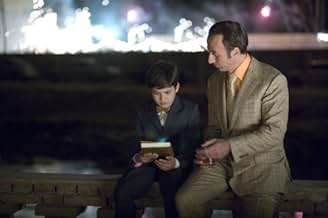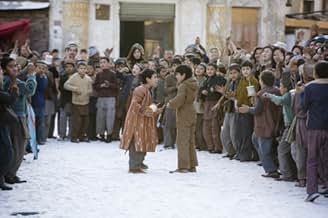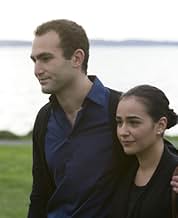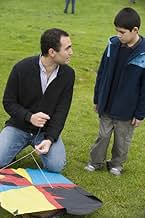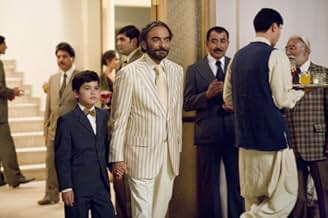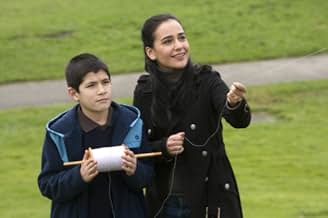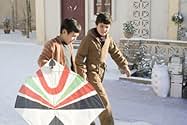IMDb-BEWERTUNG
7,6/10
84.191
IHRE BEWERTUNG
Nach Jahren in Kalifornien kehrt Amir in sein Heimatland Afghanistan zurück, um seinem alten Freund Hassan zu helfen, der in Problemen steckt.Nach Jahren in Kalifornien kehrt Amir in sein Heimatland Afghanistan zurück, um seinem alten Freund Hassan zu helfen, der in Problemen steckt.Nach Jahren in Kalifornien kehrt Amir in sein Heimatland Afghanistan zurück, um seinem alten Freund Hassan zu helfen, der in Problemen steckt.
- Regie
- Drehbuch
- Hauptbesetzung
- Für 1 Oscar nominiert
- 6 Gewinne & 25 Nominierungen insgesamt
Empfohlene Bewertungen
Greetings again from the darkness. Based on the mega-best seller from author Khaled Hosseini, the film provides us a peak at the ugliness of post-Russia invaded Afghanistan and the terror of the Taliban. Director Marc Foster adds a gem to his resume, which already includes "Monster's Ball", "Finding Neverland" and "Stranger Than Fiction".
The story of young friends Amir and Hassan and the unknown bond they share into the next generation. This is a story of honor and courage and loyalty and is an unusual coming-of-age tale. Some great scenes of the boys when they are kids and then a couple of truly amazing scenes as Amir returns as an adult to find Hassan's imprisoned son.
This is tight, compelling story telling with a message. The acting is solid throughout, with no one actor stealing the screen. Although not a pleasant story to watch unfold, it is certainly meaningful and heart felt. Plus a quick shot of Midnight Oil playing in the pool hall is a welcome gift.
The story of young friends Amir and Hassan and the unknown bond they share into the next generation. This is a story of honor and courage and loyalty and is an unusual coming-of-age tale. Some great scenes of the boys when they are kids and then a couple of truly amazing scenes as Amir returns as an adult to find Hassan's imprisoned son.
This is tight, compelling story telling with a message. The acting is solid throughout, with no one actor stealing the screen. Although not a pleasant story to watch unfold, it is certainly meaningful and heart felt. Plus a quick shot of Midnight Oil playing in the pool hall is a welcome gift.
I have read both the book and saw the movie today. The storyline is so powerful that almost any script or screenplay would have done justice to it. So nothing much there. However, this is still a beautiful movie because it makes one think and feel, just like the book. Watching it is not like watching a documentary on a failed state and feeling sympathetic towards people suffering under an oppressive regime, but is like watching any other common man's story unfold, across generations, across continents. Amir's cowardice, his guilt, his dilemmas and finally his choosing a way of redemption could have been a story of any of us. There isn't a single infallible character to look up to and idolize but all of them are gray, just like all of us.
Another important observation is that the movie does a great job of chronicling the lives of Afghans through the twenty some years of turbulent political scenarios. The vibrant, care-free childhood represents Kabul before the Russian invasion and the desolate, shattered remains of the city echo what the Taliban has done to it.
The child actors deserve 'thumbs up' all the way. They can put any matured actor to shame.
If you have not yet seen the movie or read the book, just walk into the theater keeping in mind that you are going to witness a multi-layered story woven on a multi-colored fabric of human emotions and sentiments. This movie is not meant to stir anti-Soviet and anti-Taliban feelings but to feel the trials of human existence.
I read some of the external reviews linked to the site and I must confess I do not see the point in writing reviews that summarize the storyline like a distant spectator and point out technical details about amazing cinematography or something similar. At least for this movie, one should try to connect to it rather than judging it objectively.
Another important observation is that the movie does a great job of chronicling the lives of Afghans through the twenty some years of turbulent political scenarios. The vibrant, care-free childhood represents Kabul before the Russian invasion and the desolate, shattered remains of the city echo what the Taliban has done to it.
The child actors deserve 'thumbs up' all the way. They can put any matured actor to shame.
If you have not yet seen the movie or read the book, just walk into the theater keeping in mind that you are going to witness a multi-layered story woven on a multi-colored fabric of human emotions and sentiments. This movie is not meant to stir anti-Soviet and anti-Taliban feelings but to feel the trials of human existence.
I read some of the external reviews linked to the site and I must confess I do not see the point in writing reviews that summarize the storyline like a distant spectator and point out technical details about amazing cinematography or something similar. At least for this movie, one should try to connect to it rather than judging it objectively.
I know that to include everything in the book, the film would have to have been several hours long, so I think they did their best to include things that were crucial and pivotal to the story. I thought the casting was great, the children who played Amir and Hassan were very good actors. And the guy who played Amir as an adult was great! The scenes between him and Baba were especially touching. I thought the locations they used were interesting... scenes set in Afghanistan were shot in China, and one scene that took place in Fremont, CA (the graduation scene) was actually shot on Treasure Island in San Francisco. I worked one day as an extra on "Kite Runner" and it was that day, the day they shot the graduation scene. We reported to Treasure Island in the morning, they checked everyone's wardrobe to make sure it looked like the late 80s, an then we took our places in the audience. They shot the scene over and over again until they were happy with it. It was cool to see the actors up close and also to see the book's author, who was on hand as a story consultant. I thought this book was excellent and I recommend both the book and the movie to anyone. This is a moving story about friendship, love, guilt and eventual redemption. "There is a way to be good again."
After seeing the prosthetic legs dropping from the sky by parachute in Kandahar (2001), one of the most memorable images in all of cinema, I wondered why there weren't more stories coming out of such a tumultuous country, tied to Americans forever by 9/11. And now I think I know why.
Such a beautifully-wrought adaptation of the wildly-popular novel of the same name, The Kite Runner is a model of fine film-making in almost all respects except one: It's too pat. So maybe Charlie Wilson's War will show me that films about Afghanistan will not revolve around formulae and clichés.
The redemption of the protagonist, Amir (Khalid Abdalla), has been told forever in literature and film, just not in Afghanistan. So no matter how tear-jerking the film may be, it is still a story told many times of a man who commits an egregious sin as a child but redeems himself in the end with an act of courage. Meanwhile, director Marc Forster and screenwriter David Beniof lace the film with the major motif, kite running, to such an ingenious extent that it not only ties in the hero's youth with his maturity, it also provides a figurative way of showing the desolation and hope of the country mixed of course with contradictory elements such as cutting string and blessed artificial legs.
Thus the film as metaphor is a success in showing the dismal past of a struggling country and its hopeful future. The cinematic images also emphasize this duality: The vistas with snow capped mountains and endless plains deflect the vision of a barren land where trees that manage to grow have been cut down by invaders, in this case 1979 Russia. The titular activity flourishes in large part because the arid, stony land offers few other possibilities. When the land is revisited in 2000, the limited country seems almost completely bereft of color and resources, a gray prison that parades adulterers to be stoned in the soccer stadium and little boys abused by an out-of-control Taliban.
But true to the formula, Amir has a second chance. I hope Afghanistan shares a similar fate.
Such a beautifully-wrought adaptation of the wildly-popular novel of the same name, The Kite Runner is a model of fine film-making in almost all respects except one: It's too pat. So maybe Charlie Wilson's War will show me that films about Afghanistan will not revolve around formulae and clichés.
The redemption of the protagonist, Amir (Khalid Abdalla), has been told forever in literature and film, just not in Afghanistan. So no matter how tear-jerking the film may be, it is still a story told many times of a man who commits an egregious sin as a child but redeems himself in the end with an act of courage. Meanwhile, director Marc Forster and screenwriter David Beniof lace the film with the major motif, kite running, to such an ingenious extent that it not only ties in the hero's youth with his maturity, it also provides a figurative way of showing the desolation and hope of the country mixed of course with contradictory elements such as cutting string and blessed artificial legs.
Thus the film as metaphor is a success in showing the dismal past of a struggling country and its hopeful future. The cinematic images also emphasize this duality: The vistas with snow capped mountains and endless plains deflect the vision of a barren land where trees that manage to grow have been cut down by invaders, in this case 1979 Russia. The titular activity flourishes in large part because the arid, stony land offers few other possibilities. When the land is revisited in 2000, the limited country seems almost completely bereft of color and resources, a gray prison that parades adulterers to be stoned in the soccer stadium and little boys abused by an out-of-control Taliban.
But true to the formula, Amir has a second chance. I hope Afghanistan shares a similar fate.
In the 70's in Afghanistan, the Pushtun boy Amir (Zekeria Ebrahimi) and the Hazara boy Hassan (Ahmad Khan Mahmoodzada), who is his loyal friend and son of their Hazara servant Ali (Nabi Tanha), are raised together in Amir's father house, playing and kitting on the streets of a peaceful Kabul. Amir feels that his wise and good father Baba (Homayoun Ershadi) blames him for the death of his mother in the delivery, and also that his father loves and prefers Hassam to him. In return, Amir feels a great respect for his father's best friend Rahim Khan (Shaun Toub), who supports his intention to become a writer. After Amir winning a competition of kitting, Hassam runs to bring a kite to Amir, but he is beaten and raped by the brutal Assef (Elham Ehsas) in an empty street to protect Amir's kite; the coward Amir witness the assault but does not help the loyal Hassam. On the day after his birthday party, Amir hides his new watch in Hassam's bed to frame the boy as a thief and force his father to fire Ali, releasing his conscience from recalling his cowardice and betrayal. In 1979, the Russians invade Afghanistan and Baba and Amir escape to Pakistan. In 1988, they have a simple life in Fremont, California, when Amir graduates in a public college for the pride and joy of Baba. Later Amir meets his countrywoman Soraya (Atossa Leoni) and they get married. In 2000, after the death of Baba, Amir is a famous novelist and receives a phone call from the terminal Rahim Khan, who discloses secrets about his family, forcing Amir to return to Peshawar, in Pakistan, in a journey of redemption.
I am not familiar with the Afghan culture and I did not read this novel in spite of the recommendation of my daughter, and yesterday I decided to watch this movie on DVD. I found a good story of loyalty, cowardice, betrayal and redemption, with a brief insight in the recent history of Afghanistan, from a peaceful period in the 70's to the present days with the Taliban. The actors and actresses have great performances, giving credibility to the realistic story. The arid locations in China recall the images we see in television from Afghanistan. In the end, I found "The Kite Runner" a good movie. My vote is seven.
Title (Brazil): "O Caçador de Pipa" ("The Kite Chaser")
I am not familiar with the Afghan culture and I did not read this novel in spite of the recommendation of my daughter, and yesterday I decided to watch this movie on DVD. I found a good story of loyalty, cowardice, betrayal and redemption, with a brief insight in the recent history of Afghanistan, from a peaceful period in the 70's to the present days with the Taliban. The actors and actresses have great performances, giving credibility to the realistic story. The arid locations in China recall the images we see in television from Afghanistan. In the end, I found "The Kite Runner" a good movie. My vote is seven.
Title (Brazil): "O Caçador de Pipa" ("The Kite Chaser")
Wusstest du schon
- WissenswertesDue to Afghan mores concerning male rape, Paramount Vantage agreed to relocate the young actors out of the country to the United Arab Emirates and arrange visas, housing and schooling for the young actors and jobs for their guardians. Paramount Vantage accepts responsibility for the living expenses of Zekeria Ebrahimi, Ahmad Khan Mahmoodzada, Ali Danish Bakhtyari and Sayed Jafar Masihullah Gharibzada until they reach adulthood, a cost some estimated at up to $500,000.
- PatzerIn the scene at the stadium just before the Taliban official gives his speech there is a soccer game going on and most of the players are wearing shorts. The Taliban did not allow shorts or revealing clothes of any kind to be worn, even at an athletic event. They imprisoned and persecuted members of visiting Pakistani teams for wearing shorts.
- Zitate
Young Hassan: For you, a thousand times over
- SoundtracksAye Dara Kay Jaylawni
Traditional
Top-Auswahl
Melde dich zum Bewerten an und greife auf die Watchlist für personalisierte Empfehlungen zu.
- How long is The Kite Runner?Powered by Alexa
Details
- Erscheinungsdatum
- Herkunftsländer
- Offizieller Standort
- Sprachen
- Auch bekannt als
- Cometas en el cielo
- Drehorte
- Kashgar, China(arrival in Peshawar/Rahim Khan's apartment in Peshawar)
- Produktionsfirmen
- Weitere beteiligte Unternehmen bei IMDbPro anzeigen
Box Office
- Budget
- 20.000.000 $ (geschätzt)
- Bruttoertrag in den USA und Kanada
- 15.800.078 $
- Eröffnungswochenende in den USA und in Kanada
- 471.713 $
- 16. Dez. 2007
- Weltweiter Bruttoertrag
- 75.011.029 $
- Laufzeit
- 2 Std. 8 Min.(128 min)
- Farbe
- Sound-Mix
- Seitenverhältnis
- 2.39 : 1
Zu dieser Seite beitragen
Bearbeitung vorschlagen oder fehlenden Inhalt hinzufügen







